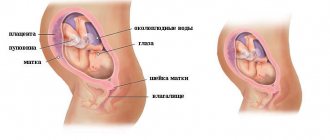Discharge from the maternity hospital: what day after birth does it occur?
Depending on the type of labor, as well as complications after it, doctors set different lengths of stay for the woman and child in the maternity hospital. Let's consider how many days a woman needs to be under the supervision of specialists.
Natural childbirth: on what day is it discharged?
If a woman gives birth on her own, and there are no postpartum consequences, then discharge occurs on the 3rd day. This procedure includes a mandatory examination by a gynecologist and a neonatologist; based on the results, a decision is made on the discharge procedure.
Childbirth with maternal complications
There are situations when labor is accompanied by serious complications for a woman. In this case, discharge from the maternity hospital is postponed until the problem is resolved. The most common postpartum complications are:
- severe tears, which are accompanied by suturing (the woman is allowed to go home no earlier than 4-5 days);
- heavy bleeding during childbirth, manual separation of the placenta or curettage (the patient is left under the supervision of doctors for a week);
- inflammatory process on the scar after cesarean section, etc. (for treatment, intravenous drips with antibiotics or surgical intervention are prescribed, the patient is left in the maternity hospital until complete recovery);
- anemia due to severe blood loss;
- weak uterine contraction;
- consequences of gestosis (staying in the maternity hospital is required until blood pressure is completely stabilized).
To determine the pathology, the woman is examined on a gynecological chair, then an ultrasound procedure is prescribed.
Based on the results of a comprehensive examination, a decision is made on the length of stay in the maternity hospital. An important point is the appearance of colostrum and breast milk in a woman. To establish this process, the patient is examined and trained by a breastfeeding specialist.
Normally, immediately after birth, the baby is applied to the breast to release colostrum. The arrival of milk after a natural birth occurs on the 3rd day, after a cesarean section a little later. Weak lactation is not a reason for a delay in discharge from the hospital.
Fetal pathologies: how many days do they stay in the maternity hospital?
After birth, the baby is examined by a neonatologist and assessed his condition using the Apgar scale. A common reason for delayed discharge from the maternity hospital is severe pathologies of the child. They can occur during labor or during fetal development. The main types of complications are:
- congenital diseases (phenylketonuria, hypothyroidism, etc.);
- lack of weight (normally, weight loss should stop on the 3-4th day after birth, if this indicator is very high, then the baby is left under the supervision of doctors);
- jaundice of newborns;
- premature birth;
- pathologies of the nervous system against the background of severe hypoxia;
- decreased muscle tone;
- lack of basic reflexes;
- infectious diseases.
Before discharge, the pediatrician conducts a mandatory examination of the umbilical cord wound; if it heals poorly or has a pronounced inflammatory process, the child is left in the hospital. Discharge occurs subject to the complete elimination of the problem; this may take up to 14 days.
Fetal death
A distinction is made between antenatal and intranatal fetal death.
In the first case, doctors diagnose the death of the child during pregnancy, and removal is carried out within 14 days after the diagnosis is established. Intrapartum fetal death is caused by problems during childbirth. This may be due to the placenta, amniotic fluid, genetic problems, hypoxia and other reasons. In this case, the woman is left in the maternity hospital for 7 days, after which, in the absence of contraindications, she is sent home.
Caesarean section without complications
If the birth took place by cesarean section without visible complications, then the woman is discharged on the 5-7th day. Upon discharge, they evaluate how well the sutures are healing, how the woman’s recovery is going, etc.
What happens after a caesarean section
Caesarean section (CS) is a complex operation that is performed when a woman in labor has a number of indications. Delivery must take place under anesthesia:
- epidural or spinal - used most often, they differ in the length of the needles used and the site of drug administration;
- general anesthesia.
The operation itself lasts only 20–40 minutes. However, serious recovery is required after it.
Immediately after the application of sutures or staples is completed, the woman is transferred to the intensive care unit (or to the intensive care ward, if provided by the medical institution). Here she goes through a recovery period, gains strength and prepares for a full meeting with her newborn baby.
Most often, spinal or epidural anesthesia is used for CS.
According to statistics, up to 28% of children in Russia are born by caesarean section.
After the CS operation, a number of measures are carried out to help the woman in labor recover faster:
- immediately after surgery, an ice pack is placed on the abdomen, which helps prolong the analgesic effect and also reduces the risk of bleeding;
- Oxytocin or Dinoprost is administered, which accelerate uterine contractions;
- if necessary, medications are prescribed to normalize the functioning of the gastrointestinal tract and antibiotics, which help to avoid a number of postoperative complications;
- provide care and constant monitoring of the woman’s condition, which contribute to the rapid recovery of the body, so that the mother can independently care for the baby born as soon as possible.
Babies are born completely defenseless, and the mother needs to recover from surgery as soon as possible in order to provide care for the child
Where to transfer from the maternity hospital in case of fetal pathologies
Each maternity hospital has a neonatal pathology department. This is where mother and child are transferred if there are pathologies. In this department, the necessary treatment is carried out, and after successful completion they are sent home.
If a child was born premature, breathes poorly, has jaundice and other pathologies, he is placed in a special chamber. He is in a shared ward, where his mother is also staying. In the absence of such a department, the child and mother are transferred to a specialized medical institution.
Why do women in labor need to stay in the hospital for some time?
During her stay in the maternity hospital, a woman will be introduced to the basics of caring for a child: they will be taught how to properly attach him to the breast, change diapers, swaddle him, hold and soothe him, conduct a thorough examination of the newborn, take blood tests and give him his first vaccinations. All this takes some time - at least several days.
In addition, the length of a woman’s stay in the maternity hospital depends on what the birth process was like. Childbirth can be:
- physiologically normal without complications;
- long-term with complications;
- planned, by caesarean section;
- premature;
- emergency.
The first few days after the baby is born can be dangerous for both parties. A woman in labor may experience complications such as:
- insufficient intensity of uterine contractions;
- bleeding and anemia;
- inflammation and secondary infections;
- unsatisfactory healing of sutures, their inflammation.
As for the child, the following dangers may await him in the first days of life:
- cessation of breathing - apnea;
- asphyxial pneumonia, occurs in premature or low-birth-weight children;
- neonatal sepsis;
- physiological and pathological jaundice;
- necrotizing enterocolitis;
- meconium aspiration syndrome.
How long can they be kept in a maternity hospital by law?
According to the legislative framework, in the absence of complications, a woman is kept in the maternity hospital for no more than 4 days (after a natural birth) and no more than 10 days (after a cesarean section).
The stay in the pathology department is determined by the doctor individually and can last up to several months (in the case of premature babies).
If complications appear after discharge from the maternity hospital (incomplete removal of the placenta, development of an infectious process, etc.), the woman in labor should go to the maternity hospital where she gave birth. According to the law, she will undergo treatment and eliminate the existing problem. The only negative point is that the woman is in the department of pathology of pregnant women without a child (regular pumping is recommended to maintain lactation).
What happens in intensive care
You shouldn’t think that a new mother, while in intensive care, just lies down all the time. The sooner a woman begins to move, the sooner the recovery process will be completed and the less likely it is that uterine subenvolution will occur - an accumulation of blood clots that can provoke heavy bleeding or cause suppuration. That is why, 3-4 hours after the operation, doctors recommend that the woman begin to turn over in bed. At first it is unlikely that she will be able to do this on her own, and she will be turned from side to side by nurses. All movements must be done slowly and carefully, enduring pain.
The next step is to start sitting up in bed. Before this, it is worth fixing the seam with a special bandage, and if it is not there, the staff can pull the postpartum woman tightly with a sheet or large towel. This will reduce pain, and such support will act as a corset for the cut muscles, which means it will be easier to get up.
It is best to buy a postpartum bandage in advance, which you can put on in the maternity hospital.
And only then does the woman try to get up and walk - 6–8 hours after suturing. This should only be done under supervision and with support, leaning on the headboard, windowsill, or the hand of a nurse. Movements cause pain, they need to be done in doses, with breaks. But be sure to do it, always remembering that the baby is waiting for his mother.
I had a cesarean section twice. For the first time, the doctor’s request to turn over in bed 4 hours after the operation seemed impossible. And the first steps after 6 hours were a serious test: after the operation I have to learn to walk again. After the second operation, the pain was felt less, probably because everything that would have to go through while in intensive care was already known in practice. And the nurses were more persistent the second time: after 4 hours they helped me get out of bed, and after 6 hours they allowed me to walk to the toilet on my own.
How long do they spend in intensive care?
If there are no complications and the woman’s condition has returned to normal, she will have to stay in the intensive care unit for 12 hours to 24 hours, and then she will be transferred to the postpartum ward. But there are situations when the mother needs a longer stay (two or even three days) in the intensive care unit under the constant supervision of medical workers. The decision to transfer the mother to the general ward is made by the doctor based on her condition, the results of the examination and the characteristics of the operation.
From personal experience: after my first caesarean section, I was in intensive care for a day. After the second, I was transferred to the department 12 hours later.
Video: the first hours after a caesarean section
Is it possible to discharge yourself from the maternity hospital?
If a woman wants to go home ahead of schedule, this can be done after writing an official statement. It must stipulate that the patient takes responsibility for all possible risks and complications that may occur after discharge from the hospital. In this case, the doctor conducts a mandatory examination of the woman and child; if pathologies are detected, discharge is refused.
Experts do not recommend making such a decision. Very often, complications appear a few days after birth, in which case the woman and child are taken to the emergency hospital.
C-section
In recent years, delivery by caesarean section has become increasingly common. And, contrary to the active movement of specialists for natural childbirth, many women, especially after 30, insist on prompt assistance at the birth of their babies.
How long will you have to stay in the hospital after giving birth via cesarean section? Ideally, you can get home within 5-6 days. This is provided that the woman’s body has coped well with the postoperative period (and a caesarean section is nothing more than a strip operation), and the baby’s condition is satisfactory.
However, sometimes it happens that the stitches do not heal as quickly as you would like, and the strength does not come as quickly as it seemed at first. Well, then you'll have to stay a while. For a couple of weeks or even longer. How long your “imprisonment” will be depends on several factors in this case.
What were the indications for caesarean section? Are these the mother's or the baby's vital signs? Was the operation planned or urgent, which was resorted to as a result of unfavorable development of labor? Only knowing the true reasons can we make some predictions. However, only your attending physician can more or less accurately answer the question of how long you will be kept in the maternity hospital in the first day or two after birth.
Sometimes difficult births are predictable and the woman is approximately aware of what awaits her. If the reasons for the operation are exclusively maternal circumstances (problems of the mother with vision, with the heart, the need to perform some gynecological operations simultaneously with a cesarean section, etc.) and you and the doctor know about these reasons in advance - then the number of days of stay in the maternity hospital It's worth asking before the birth.
In the case of children's problems, the situation is somewhat more complicated and here it is better not to think ahead, but simply wait until things get better, strictly following the doctor’s instructions.
What documents should be issued at the maternity hospital after discharge?
Among the mandatory documents from the maternity hospital, the mother should have in her hands:
- A certificate of birth of a child, which is provided to the district registry office when issuing a birth certificate.
- Child's exchange card for transfer to the district clinic. It indicates all the conclusions of the neonatologist from the maternity hospital: the weight, height of the child, as well as mandatory information about the vaccination performed. In the maternity hospital, the baby is vaccinated against tuberculosis and hepatitis B.
- A woman's exchange card, which is given to the antenatal clinic. 2 months after giving birth, the mother undergoes a mandatory examination by a doctor.
- Birth certificate spine. It is transferred to a children's clinic, where the child is monitored during the first year after birth.
Discharge from the maternity hospital occurs on the 4th to 10th day after birth. It all depends on the type of labor, the condition of the mother and child. If there are complications or congenital pathologies, a stay in the neonatal pathology department is required. The timing is determined by the doctor individually; the mother and baby are discharged after all problems have been eliminated.
About observation by pediatricians
Every day, the neonatologist examines the baby’s umbilical cord, his skin, evaluates the baby’s urination, stool, muscle tone and reflexes.
The baby is given a blood sample to check for congenital diseases: phenylketonuria, galactosemia, hypothyroidism, cystic fibrosis and adrenogenital syndrome. Before discharge, the baby is given the first vaccination against hepatitis B and tuberculosis.
The following conditions lead to a delay in the discharge of a newborn:
- Weight loss. Its decrease is considered normal on the 3-4th day of life, when it does not exceed 6-8% of the indicator with which the baby was born. If the loss is greater, then the neonatologist looks for the reason, and then discharges the baby.
- Severe jaundice. Treatment includes infusion therapy and phototherapy.
- Prematurity of the child. Such a baby is predisposed to significant loss of weight and heat and needs to be placed in an incubator for nursing.
- Nervous system disorders. They may be a consequence of hypoxia.
- Infectious diseases. A skin infection and detected cytomegalovirus require a course of antibacterial and antiviral therapy.
All of the above are rare exceptions to the rule. The majority of births in women observed during pregnancy at the antenatal clinic proceed favorably, which means they are discharged from the maternity hospital without delay.
Standards for hospital stay
The length of hospital stay is calculated based on the type and profile of the clinic, the organization of care and treatment, and the occupancy rate. According to medical and economic standards, the period that a patient can spend in the hospital before discharge is on average 14 days. Patients with the same diagnosis may be in the hospital for different periods of time, based on the severity of the disease, the timeliness of hospitalization and the general condition of the body. For example, when to discharge a bedridden patient from the hospital after a stroke after a couple of weeks or several months directly depends on the type of pathology (ischemic, hemorrhagic stroke), the risk of relapses and exacerbation of concomitant diseases. Subsequent therapy consists of outpatient treatment and takes at least 4 months.
Average number of days a patient stays in a hospital bed:
The decision about the patient’s readiness for discharge should be made on the basis of an individual approach, in accordance with laboratory and instrumental examination data, and the general clinical picture of the disease.
Reference. An indicator of the quality of work of state medical organizations is the speed of hospital bed turnover - the number of patients it “accepted” in a year. The growth of this indicator allows us to serve a larger number of patients and increase the amount of insurance premiums received into the institution’s budget.
The patient refuses discharge
Relatives and guardians are often faced with the question of what to do if they discharge a bedridden patient from the hospital who, in their opinion, has received insufficient medical services? As a rule, these are severe patients who require constant outside supervision and further treatment at home.
You can influence the decision of doctors to extend therapy in the inpatient department of the hospital and delay the date of discharge by writing to the following authorities:
- the administration of the medical institution with a request to the chief physician to convene a special medical commission;
- Department of Health or Roszdravnadzor;
- Ministry of Health hotline website;
- an insurance company for examination and quality of medical services provided;
- law enforcement agencies - the prosecutor's office, the court (based on the conclusion of the discharge summary).
Important! Making a decision on the advisability of exceeding the standard period of round-the-clock stay in the hospital does not depend on the desire or social problems of the patient, but on objective indicators of his health.
A negative verdict means that the patient will be warned in advance about the discharge date and relatives are obliged to pick up the bedridden patient from the hospital. In the epicrisis, the inpatient doctor gives recommendations regarding the further course of treatment and the rehabilitation process.
In accordance with Federal Law N 323-FZ “On the Fundamentals of Protecting the Health of Citizens in the Russian Federation,” a bedridden patient, after discharge from the hospital, has the right to receive free medical care at home, both from a local physician and from specialized specialists.








